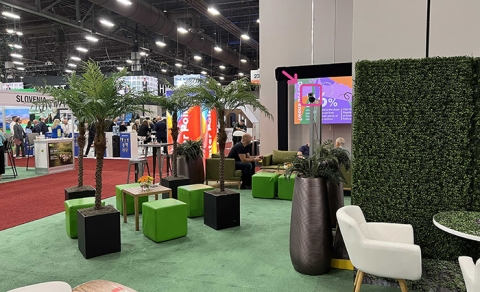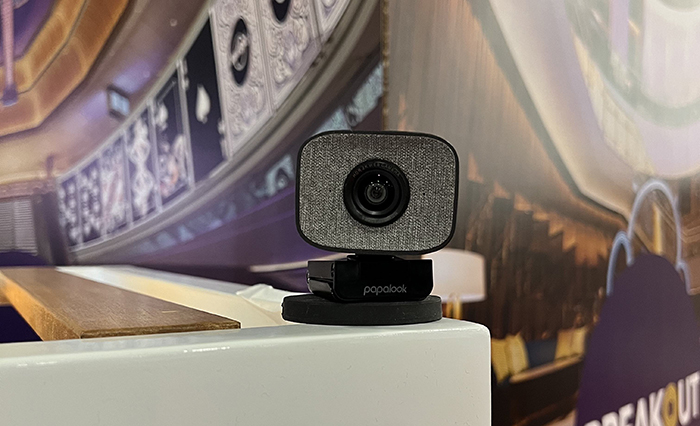How IMEX Is Using Technology to Measure Attendee Sentiment

“There's an old saying that goes … if it's measured, it's managed,” said Oliver Bailey, head of Interaction Design for IMEX Group. “So the opposite is also true. If you're not measuring something, you can't be expected to manage it effectively.”
But how do you measure event design and experiences?
Bailey and his team are working with Zenus to measure attendee sentiment, as well as traffic, dwell time and demographics in several locations at the upcoming IMEX America, taking place Oct. 17-19 at Mandalay Bay Convention Center in Las Vegas. Always looking to experiment and try new event tech, Bailey deployed Zenus technology for the first time at IMEX America 2022 and then again at IMEX Frankfurt in May.
“We started using this technology in the first place so that we could be more strategic when it came to event design, particularly experience design,” Bailey said.

IMEX will set up the Zenus technology in active and engaging sponsorship areas, the wellness lounge, catering areas and select education sessions. Zenus is also working with a number of individual exhibitors, like Encore and Google Xi, to provide data on their experiential design and activations.
“We're trying to create that data culture around live events to show people that live events are actually superior to the digital world in many ways because you can get the same kind of metrics from live events now using this kind of data and others,” Bailey said. “But you're there in person. You're getting that immediate connection. We're trying to take our events to the next level.”
We caught up with Bailey and Zenus Co-Founder and CEO Panos Moutafis to find out how IMEX is deploying the technology, what data they are collecting and how they take action on what they measure.
Here are five key quotes from our interview.
What areas will be measured? “Anywhere that positive sentiment is a success criteria and anything where that data will help us iterate, or we can use it to add context and value to a client or sponsor,” Bailey said. “That's the thing we really love about this technology because it's very hard to measure it other than just to stand there observing the whole time.”

How does the tech work? A small piece of hardware is sent up. The device connects to a sensor with a camera. IMEX will be deploying 60-90 boxes, Panos said. “The physical environment is converted into statistics instantly,” he said. “The video is not stored on a device. The technology can analyze a face multiple times per second, and the system has been trained in a way to score the positivity of facial expressions. So for example, surprise might be negative or it might be positive. The ability to distinguish between the two is very important. Excitement, smiles, laughs, anything that surrounds a positive experience has to be measured, quantified, intensity, duration, frequency and so forth. Then we're looking at the aggregate and that's very important. We're just looking at the group level anonymously.”
What about privacy concerns? “It's something that's at the forefront of our minds,” Bailey said. “But there's obviously a very important difference between facial analysis, in this case, and facial recognition, which is something that's quite opposite to this. Facial recognition would be detecting a face, linking that to an actual person or to information about a person. That's not what we're talking about. We're talking anonymously looking at faces, impressions of faces and saying that's a happy face. That's a neutral face. It's entirely anonymous.”

How does it provide value for a sponsor? At IMEX Frankfurt, “We worked with a sponsor, and they wanted to go beyond just putting up some static branding and create something more experiential. We created an area at the entrance of the hall that had some visuals, but it also had sounds and scent machines. We really themed the area so that when you were walking through that space, you were clearly in a different environment. We used the technology in this area because then we were immediately able to contrast this space with another space and other sponsorships that weren't perhaps as active as well. It's a big investment doing a sponsorship, and it gives people confidence then if we're able to say, hey, look, it really worked.”
What’s next? Bailey said, “At the moment, we've been looking at [the data] pretty much after the fact, but I want to start using it in the moment because … why not? We're in a live environment. It's live data. We can access it live. It'd be crazy not to. So that's where we'll try and get to in the future. It's a question of giving ourselves, I think, the bandwidth, to be able to use this data with our own observations included so that we can use it to act. It's a question of rolling it out in a more meaningful way and plugging it into our own processes and our other technologies, as well.”
Want to take a deeper dive? Watch or listen to the full interview here.
Don’t miss any event-related news: Sign up for our weekly e-newsletter HERE, listen to our latest podcast HERE and engage with us on Twitter, Facebook and LinkedIn!


Add new comment